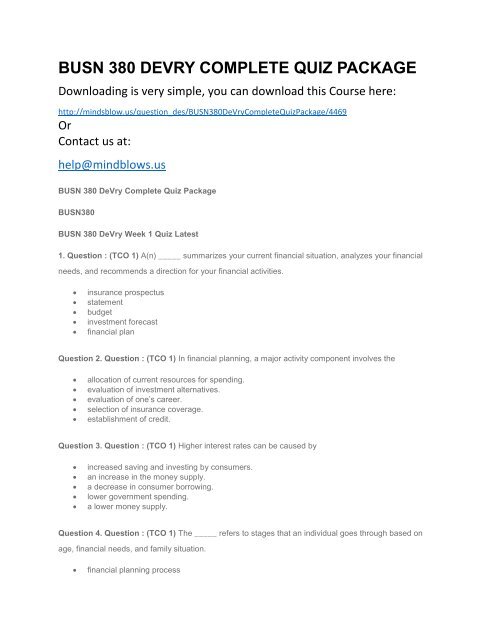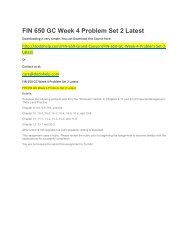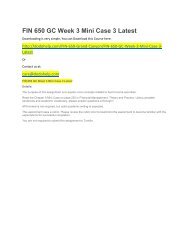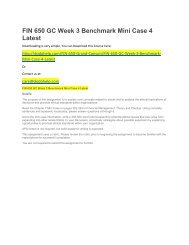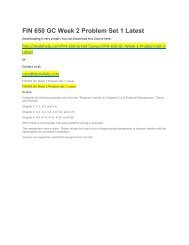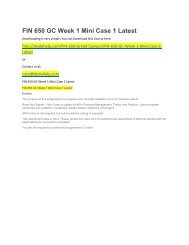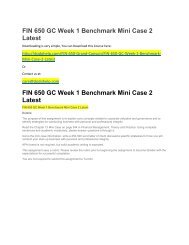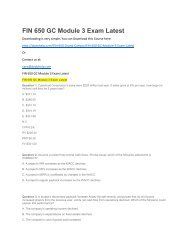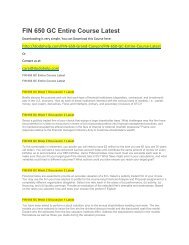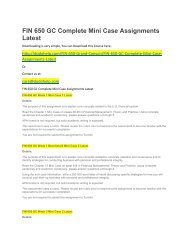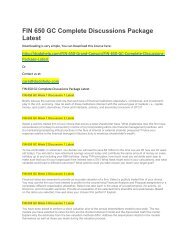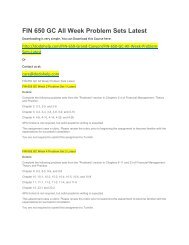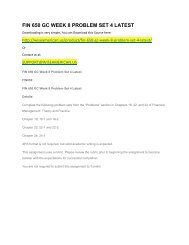BUSN 380 DEVRY COMPLETE QUIZ PACKAGE
Create successful ePaper yourself
Turn your PDF publications into a flip-book with our unique Google optimized e-Paper software.
<strong>BUSN</strong> <strong>380</strong> <strong>DEVRY</strong> <strong>COMPLETE</strong> <strong>QUIZ</strong> <strong>PACKAGE</strong><br />
Downloading is very simple, you can download this Course here:<br />
http://mindsblow.us/question_des/<strong>BUSN</strong><strong>380</strong>DeVryCompleteQuizPackage/4469<br />
Or<br />
Contact us at:<br />
help@mindblows.us<br />
<strong>BUSN</strong> <strong>380</strong> DeVry Complete Quiz Package<br />
<strong>BUSN</strong><strong>380</strong><br />
<strong>BUSN</strong> <strong>380</strong> DeVry Week 1 Quiz Latest<br />
1. Question : (TCO 1) A(n) _____ summarizes your current financial situation, analyzes your financial<br />
needs, and recommends a direction for your financial activities.<br />
<br />
<br />
<br />
<br />
<br />
insurance prospectus<br />
statement<br />
budget<br />
investment forecast<br />
financial plan<br />
Question 2. Question : (TCO 1) In financial planning, a major activity component involves the<br />
<br />
<br />
<br />
<br />
<br />
allocation of current resources for spending.<br />
evaluation of investment alternatives.<br />
evaluation of one’s career.<br />
selection of insurance coverage.<br />
establishment of credit.<br />
Question 3. Question : (TCO 1) Higher interest rates can be caused by<br />
<br />
<br />
<br />
<br />
<br />
increased saving and investing by consumers.<br />
an increase in the money supply.<br />
a decrease in consumer borrowing.<br />
lower government spending.<br />
a lower money supply.<br />
Question 4. Question : (TCO 1) The _____ refers to stages that an individual goes through based on<br />
age, financial needs, and family situation.<br />
<br />
financial planning process
financial cycle<br />
adult life cycle<br />
personal economic cycle<br />
tax planning process<br />
Question 5. Question : (TCO 1) The future value of an account in which $2,000 is deposited each year<br />
for 5 years, and which earns 4%, is approximately _____ after 5 years.<br />
$2,000<br />
$2,400<br />
$10,000<br />
$400<br />
$10,800<br />
Question 6. Question : (TCO 1) Higher employment levels can be attributed to<br />
<br />
<br />
<br />
<br />
<br />
lower consumer prices.<br />
reduced employment levels.<br />
lower interest rates.<br />
higher employment levels.<br />
increased consumer spending.<br />
Question 7. Question : (TCO 1) When it comes to the financial planning process, the first step is to<br />
<br />
<br />
<br />
<br />
<br />
develop financial goals.<br />
implement the financial plan.<br />
evaluate and revise your actions.<br />
analyze your current personal and financial situation.<br />
create a financial plan of action.<br />
Question 8. Question : (TCO 1) The simple calculation of interest can be performed by multiplying the<br />
amount in a savings account by the<br />
<br />
<br />
<br />
<br />
<br />
annual interest rate.<br />
annual interest rate and the time period.<br />
number of months in a year.<br />
time period and number of months.<br />
time period.<br />
Question 9. Question : (TCO 1) Brad Opper has a goal of “saving $50 a month for vacation.” Brad’s goal<br />
lacks<br />
<br />
<br />
<br />
<br />
<br />
a realistic perspective.<br />
specific terms.<br />
the type of action to be taken.<br />
a purpose.<br />
a time frame.
Question 10. Question : (TCO 1) _____ risk refers to the changing cost of money.<br />
<br />
<br />
<br />
<br />
<br />
Monetary<br />
Inflation<br />
Economic<br />
Personal<br />
Interest rate<br />
Question 11. Question : (TCO 1) You want to determine the current value of an annuity that pays $350 a<br />
month for the next 5 years. What type of calculation would provide you with this value?<br />
<br />
<br />
<br />
<br />
<br />
Future value of a single amount<br />
Simple interest<br />
Present value of a single amount<br />
Future value of a series of deposits<br />
Present value of a series of deposits<br />
Question 12. Question : (TCO 1) A commitment to a profession that requires continued training and<br />
offers a clear path for occupational growth is a(n)<br />
<br />
<br />
<br />
<br />
<br />
apprenticeship.<br />
internship<br />
employment.<br />
cooperative employment experience.<br />
career.<br />
Question 13. Question : (TCO 1) In order to evaluate one’s current financial position (including net<br />
worth), the best tool that can be used is a<br />
<br />
<br />
<br />
<br />
<br />
budget.<br />
cash flow statement.<br />
bank statement.<br />
time-value-of-money report.<br />
balance sheet.<br />
Question 14. Question : (TCO 1) A _____ résumé would best be used by an employee who has worked<br />
in many fields and has a variety of skills in a variety of work-related categories.<br />
<br />
<br />
<br />
<br />
<br />
targeted<br />
goal-oriented<br />
chronological<br />
functional<br />
career change<br />
Question 15. Question : (TCO 1) A _____ résumé is designed to obtain a specific job.
functional<br />
chronological<br />
goal-oriented<br />
targeted<br />
data<br />
Question 16. Question : (TCO 1) Which of the following would be a competency commonly associated<br />
with successful people?<br />
<br />
<br />
<br />
<br />
<br />
An ability to work well with others in a variety of settings<br />
A desire to do tasks better than they have to be done<br />
An ability to solve problems creatively in team settings<br />
Well-developed written and oral communication skills<br />
All of the above<br />
Question 17. Question : (TCO 1) Cash and other items that are easily converted to cash are referred to<br />
as _____.<br />
<br />
<br />
<br />
<br />
<br />
quick assets<br />
working assets<br />
liquid assets<br />
investments<br />
solvent items<br />
Question 18. Question : (TCO 1) A savings amount of $3,500 on deposit for 4 years at 4% interest<br />
(compounded annually) would earn about<br />
$ 650.<br />
$ 600.<br />
$560.<br />
$140.<br />
$350.<br />
Question 19. Question : (TCO 1) Solvency can be assessed through the analysis of the following<br />
financial document.<br />
<br />
<br />
<br />
<br />
<br />
Cash flow statement<br />
Debt consolidation statement<br />
Personal income statement<br />
Credit report<br />
The balance sheet<br />
Question 20. Question : (TCO 1) Which of the following situations best represents an individual facing<br />
insolvency?
Assets $30,000; liabilities $37,000<br />
Assets $78,000; net worth $22,000<br />
Liabilities $45,000; net worth $6,000<br />
Assets $56,000; annual expenses $60,000<br />
Annual cash inflows $45,000; liabilities $50,000<br />
<strong>BUSN</strong> <strong>380</strong> DeVry Week 2 Quiz Latest<br />
1. Question : (TCO 2) This type of tax is calculated based upon the value of land and buildings.<br />
<br />
<br />
<br />
<br />
<br />
Personal<br />
Real estate<br />
Direct<br />
Proportional<br />
Regressive<br />
Question 2. Question : (TCO 2) Interest earnings of $2,400 from a taxable investment for a person in a<br />
28% tax bracket would result in after-tax earnings of<br />
$672.<br />
$1,728.<br />
$2,400.<br />
$3,333.<br />
$8,571.<br />
Question 3. Question : (TCO 2) _____ can reduce taxable income.<br />
<br />
<br />
<br />
<br />
<br />
Portfolio income<br />
Tax credits<br />
Exclusions<br />
Passive income<br />
Earned income<br />
Question 4. Question : (TCO 2) You have invested in the stock market and receive dividends. The<br />
dividend income must be reported as _____ income.<br />
<br />
<br />
<br />
<br />
<br />
passive<br />
earned<br />
investment<br />
capital gain<br />
excluded<br />
Question 5. Question : (TCO 2) George Washburn had earnings from his salary of $44,000, interest on<br />
savings of $800, a contribution to a traditional individual retirement account of $2,000, and dividends from<br />
mutual funds of $600. George’s adjusted income (AGI) would be
$43,400.<br />
$44,000.<br />
$45,400.<br />
$42,000.<br />
$42,800.<br />
Question 6. Question : (TCO 2) _____ can be calculated as a result of various items being subtracted<br />
from gross income, such as individual retirement account contributions and alimony payments.<br />
<br />
<br />
<br />
<br />
<br />
Adjusted gross income<br />
Taxable income<br />
Earned income<br />
Passive income<br />
Total exclusions<br />
Question 7. Question : (TCO 2) Expenses that a taxpayer is allowed to deduct from adjusted gross<br />
income are called _____.<br />
<br />
<br />
<br />
<br />
<br />
exemptions<br />
exclusions<br />
itemized deductions<br />
tax credits<br />
passive income<br />
Question 8. Question : (TCO 2) Taxes owed can be reduced through _____.<br />
<br />
<br />
<br />
<br />
<br />
the standard deduction<br />
a tax credit<br />
an itemized deduction<br />
an exclusion<br />
an exemption<br />
Question 9. Question : (TCO 2) In order for a dependent to qualify as an exemption, he or she must<br />
be married.<br />
receive more than one half of his or her support from the taxpayer.<br />
be under age 16.<br />
be registered in school.<br />
be a relative.<br />
Question 10. Question : (TCO 2) People who _____ must make estimated quarterly tax payments.<br />
<br />
<br />
<br />
<br />
are employed in a foreign country.<br />
receive dividends.<br />
work for the government.<br />
do not have adequate amounts withheld from income.
Question 11. Question : (TCO 2) A(n) _____ is an all-purpose account that provides several services.<br />
<br />
<br />
<br />
<br />
<br />
NOW account<br />
asset management account<br />
EFT account<br />
mutual fund<br />
money market account<br />
Question 12. Question : (TCO 2) An example of a _____ deposit is a checking account.<br />
<br />
<br />
<br />
<br />
<br />
common<br />
time<br />
current<br />
loan<br />
demand<br />
Question 13. Question : (TCO 2) An example of a place where one will encounter high fees for loans<br />
when borrowing money is a _____.<br />
<br />
<br />
<br />
<br />
<br />
credit union<br />
savings and loan association<br />
pawnshop<br />
commercial bank<br />
mutual savings bank<br />
Question 14. Question : (TCO 2) _____ are the major products offered by investment companies.<br />
<br />
<br />
<br />
<br />
<br />
Interest-bearing checking accounts<br />
Variable-rate loans<br />
Credit card accounts<br />
Savings bonds<br />
Mutual funds<br />
Question 15. Question : (TCO 2) One of the characteristics of a certificate of deposit is that it can have<br />
<br />
<br />
<br />
<br />
<br />
high interest-rate risk.<br />
low safety for savers.<br />
limited liquidity.<br />
a variable rate of return.<br />
no minimum deposit amount.<br />
Question 16. Question : (TCO 2) On a savings account, the rate of return can also be referred to as<br />
<br />
<br />
<br />
<br />
liquidity.<br />
compounding.<br />
yield.<br />
insolvency.
asset management.<br />
Question 17. Question : (TCO 2) A savings account in which interest is compounded _____ would have<br />
the highest effective yield.<br />
<br />
<br />
<br />
<br />
<br />
daily<br />
annually<br />
semiannually<br />
monthly<br />
weekly<br />
Question 18. Question : (TCO 2) At times, funds deposited in an account may be restricted by_____.<br />
<br />
<br />
<br />
<br />
<br />
a holding period<br />
outstanding checks<br />
interest earned<br />
service charges<br />
electronic banking<br />
Question 19. Question : (TCO 2) Service fees would be _____ in the bank reconciliation process.<br />
<br />
<br />
<br />
<br />
added to the bank statement balance<br />
subtracted from the bank statement balance<br />
added to the checkbook balance<br />
subtracted from the checkbook balance<br />
Question 20. Question : (TCO 2) When an individual borrows money to purchase a new home, he or<br />
she will be charged a _____.<br />
<br />
<br />
<br />
<br />
<br />
prime rate<br />
discount rate<br />
mortgage rate<br />
Treasury bond rate<br />
corporate bond<br />
<strong>BUSN</strong> <strong>380</strong> DeVry Week 3 Quiz Latest<br />
1. Question : (TCO 3) Examples of _____ include automobile and installment loans for purchasing<br />
furniture or appliances.<br />
<br />
<br />
<br />
<br />
<br />
a line of credit<br />
a credit card loan<br />
open-end credit<br />
closed-end credit<br />
convenience credit
Question 2. Question : (TCO 3) The maximum percentage of your net income that should be spent on<br />
credit purchases is recommended to be _____.<br />
10%<br />
20%<br />
30%<br />
40%<br />
50%<br />
Question 3. Question : (TCO 3) One of the concerns and risks associated with cosigning is that<br />
<br />
<br />
<br />
<br />
<br />
you are not being asked to guarantee the debt.<br />
it is not your legal responsibility to pay the debt.<br />
you’ll have to pay up to the full amount of the debt if the borrower does not pay.<br />
the creditor must first try to collect from the borrower.<br />
the creditor cannot garnish your wages.<br />
Question 4. Question : (TCO 3) Dividing monthly debt payments (not including house payments) by net<br />
monthly income will allow you to calculate your _____.<br />
<br />
<br />
<br />
<br />
<br />
net-worth-to-debt ratio<br />
debt-payments-to-income ratio<br />
liability status<br />
credit capacity status<br />
income-to-liability ratio<br />
Question 5. Question : (TCO 3) In determining your credit capacity, you first provide for basic<br />
necessities, such as<br />
<br />
<br />
<br />
<br />
<br />
furniture.<br />
home furnishings.<br />
mortgage or rent.<br />
automobiles.<br />
durable goods.<br />
Question 6. Question : (TCO 3) If you ask to review your file within _____ days of being notified of a<br />
denial based upon a credit report, the credit bureau cannot charge you a disclosure fee.<br />
10<br />
60<br />
30<br />
40<br />
20
Question 7. Question : (TCO 3) If a bank needs to examine the value of a specific asset when you are<br />
applying for a loan, this process refers to which aspect of the five Cs of lending?<br />
<br />
<br />
<br />
<br />
<br />
Character<br />
Capacity<br />
Collateral<br />
Capital<br />
Conditions<br />
Question 8. Question : (TCO 3) When reviewing your credit file, if you find that there is information that<br />
is incorrect, then<br />
<br />
<br />
<br />
<br />
<br />
there are legal remedies available to you.<br />
you have no legal remedies.<br />
credit bureaus are not required to change it.<br />
you can’t really do much about it.<br />
don’t worry much, because you will still get the credit.<br />
Question 9. Question : (TCO 3) All of the following reasons are reasonable situations when you would<br />
decide to use credit except<br />
<br />
<br />
<br />
<br />
borrowing for a stay in a hospital because of appendicitis.<br />
borrowing to pay for your expensive dinner and movie every week.<br />
borrowing to buy a printer for your home office now because you know it will be twice as<br />
expensive in 2 years.<br />
borrowing to purchase a car so that you can go to work full time.<br />
Question 10. Question : (TCO 3) Mary Jones has obtained a loan that must be paid over the next 12<br />
months and she will use this money for a vacation. What type of credit is being used?<br />
<br />
<br />
<br />
<br />
<br />
Installment sales credit<br />
Incremental credit<br />
Single lump sum credit<br />
Revolving credit<br />
Installment cash credit<br />
Question 11. Question : (TCO 3) By evaluating your credit options, you can do all of the following except<br />
<br />
<br />
<br />
<br />
<br />
reduce your finance charges.<br />
reconsider your decision to borrow money.<br />
discover a less expensive type of loan.<br />
find a lender that charges a lower rate.<br />
purchase goods and services without specific limitations.
Question 12. Question : (TCO 3) While collateralized loans may provide lower interest rates, these loans<br />
have a disadvantage because<br />
<br />
<br />
<br />
<br />
<br />
the loan must be repaid in a short period of time.<br />
you ruin your credit rating.<br />
the loan is difficult to obtain.<br />
commercial banks do not make such loans.<br />
the assets used as collateral are tied up until the loan has been repaid.<br />
Question 13. Question : (TCO 3) Referring to trends in credit union membership, it can be observed that<br />
membership has been<br />
restricted by the Tax Reform Act of 1986.<br />
declining gradually.<br />
static.<br />
growing steadily.<br />
restricted by state laws.<br />
Question 14. Question : (TCO 3) Which one of the following is a signal of a potential debt problem?<br />
<br />
<br />
<br />
<br />
<br />
Paying the maximum balance due each month<br />
Borrowing money to pay old debts<br />
Using savings to pay for major purchases<br />
Receiving notice of prompt payment from creditors<br />
Occasionally working overtime and moonlighting<br />
Question 15. Question : (TCO 3) Allison Smith starts the month with a balance of $1,100 on her credit<br />
card. On the 10th day of the month, she purchases $200 in clothes with her credit card. On the 15th day<br />
of the month, she makes a payment on her credit card of $500. The average daily balance for the month<br />
including the new purchase is $883. The average daily balance for the month excluding the new purchase<br />
is $750. Allison’s interest rate is 1.5% for the month. Allison’s bank calculates the finance charge on the<br />
credit card by using the adjusted balance method. What would Allison’s finance charges be for the<br />
month?<br />
$7.50<br />
$9.00<br />
$11.25<br />
$13.25<br />
$16.50<br />
Question 16. Question : (TCO 3) Jerry Dean starts the month with a balance of $1,500 on his credit<br />
card. On the 10th day of the month, he purchases $200 in clothes with his credit card. On the 15th day of<br />
the month, he makes a payment on his credit card of $500. The average daily balance for the month
including the new purchase is $883. The average daily balance for the month excluding the new purchase<br />
is $750. Jerry’s interest rate is 1.5% for the month. Jerry’s bank calculates the finance charge on the<br />
credit card by using the previous balance method. What would Jerry’s finance charges be for the month?<br />
$7.50<br />
$13.25<br />
$15.00<br />
$22.50<br />
$18.00<br />
Question 17. Question : (TCO 3) If Jeff rushes to purchase a home by obtaining an interest-only loan,<br />
and the reason why he wants a home is because he wants to have a house just like the one that his<br />
parents had when he was a teenager, this is an example of which of the following?<br />
<br />
<br />
<br />
<br />
<br />
Misunderstanding or lack of communication<br />
The use of money to punish<br />
Overindulgence of children<br />
Keeping up with the Joneses<br />
The expectation of instant comfort<br />
Question 18. Question : (TCO 3) Steve has three children and has purchased each of them his or her<br />
own TV that is placed in his or her respective room. Which reason for indebtedness is this an example of?<br />
<br />
<br />
<br />
<br />
<br />
Misunderstanding or lack of communication<br />
Overindulgence of children<br />
The expectation of instant comfort<br />
Keeping up with the Joneses<br />
The use of money to punish<br />
Question 19. Question : (TCO 3) _____ families rely heaviest on student loans to finance college.<br />
<br />
<br />
<br />
<br />
Low-income<br />
Middle-income<br />
High-income<br />
Large Small<br />
Question 20. Question : (TCO 3) If Tracy Sears borrows $1,250 for 1 year with an APR of 9% with no<br />
service fees, what is her total cost of credit?<br />
$125<br />
$112.50<br />
$7.50<br />
$9.38<br />
$0
<strong>BUSN</strong> <strong>380</strong> DeVry Week 4 Quiz Latest<br />
1. Question : (TCO 5) Which of the following statements is false?<br />
<br />
<br />
<br />
<br />
<br />
No one is going to make you save the money; you need to start a program.<br />
To be useful, investment objectives must be very specific.<br />
Investment goals can be different for each individual.<br />
Because investment objectives deal with the future, it is useful to plan more than 5 years in the<br />
future.<br />
A long-term investment objective involves a time period of 2 years or less.<br />
Question 2. Question : (TCO 5) If an investment objective is considered to be long term, then this<br />
means the goal should be achieved in what time frame?<br />
<br />
<br />
<br />
<br />
<br />
Less than 2 years<br />
In 2–5 years<br />
More than 5 years<br />
Less than 1 year<br />
None of the above<br />
Question 3. Question : (TCO 5) You currently hold a $1,000 corporate bond; however, if interest rates in<br />
the overall economy decrease, which of the following is most likely to be the market value of this bond?<br />
The bond is worthless.<br />
$1,000<br />
$900<br />
$1,100<br />
It is impossible to determine whether the bond’s value will increase or decrease.<br />
Question 4. Question : (TCO 5) Which of the following individuals should have the highest tolerance for<br />
risk?<br />
<br />
<br />
<br />
<br />
<br />
Joan Cummings, who is a single mother with two small children<br />
Darren Carter, who works for American Airlines and is worried that he is going to be laid off soon<br />
Barry Parks, who is an investment banker and earns over $200,000 per year<br />
Michael Clark, who is 74 years old and been retired for 6 years<br />
Fred Funderbunk, who delivers pizzas and makes about $15,000 per year<br />
Question 5. Question : (TCO 5) Mary Ann recently received a $20,000 gift from her uncle and is<br />
considering investing in stocks, because she knows that historically they have earned an approximately<br />
10–12% rate of return over the last few years. Referring to aspects of investing, Mary Ann is most<br />
concerned about which of the following?<br />
<br />
<br />
Risk<br />
Return
Diversification<br />
Liquidity<br />
Income<br />
Question 6. Question : (TCO 5) A $1,000 corporate bond pays 7.5% a year. What is the annual interest<br />
you will receive?<br />
$1,075<br />
$7.50<br />
$0.75<br />
$75.00<br />
$0<br />
Question 7. Question : (TCO 5) _____ risk occurs when an investment does not keep up with increasing<br />
price levels in our economy.<br />
<br />
<br />
<br />
<br />
<br />
Market<br />
Interest<br />
Inflation<br />
Business failure<br />
Current<br />
Question 8. Question : (TCO 5) John Farmer recently received a legal form from the company where he<br />
owns stocks that list the issues to be decided at the annual stockholders’ meeting. The item asks that he<br />
signs something that allows someone else to vote for him. What has he received?<br />
<br />
<br />
<br />
<br />
<br />
Equity<br />
Proxy<br />
Voting rights<br />
Dividends<br />
None of the above<br />
Question 9. Question : (TCO 5) Matt Dannon just bought the stock of a company that provides him with<br />
the responsibility to approve major company actions. Which one of the following best characterizes this<br />
responsibility?<br />
<br />
<br />
<br />
<br />
<br />
Voting rights<br />
Proxy<br />
Equity<br />
Dividends<br />
None of the above
Question 10. Question : (TCO 5) If Orlando Blodgett is buying the stock of the Getaway Caribbean<br />
Cruise Company. If he buys the stock today, knowing it is the first day it is selling without the dividend for<br />
this quarter, on what date is Orlando buying the stock?<br />
<br />
<br />
<br />
<br />
<br />
Record date<br />
Sale date<br />
Payment date<br />
Ex dividend date<br />
None of the above<br />
Question 11. Question : (TCO 5) Lindsey Holt owns stock in the Galloway Gems Company. She knows<br />
she will receive a $1.50 dividend each quarter. Given this, you know for sure that she purchased which<br />
type of stock?<br />
<br />
<br />
<br />
<br />
<br />
Preferred<br />
Common<br />
Blue chip<br />
Growth<br />
Penny<br />
Question 12. Question : (TCO 5) Dividends must be approved by a firm’s board of directors, and<br />
<br />
<br />
<br />
<br />
<br />
dividend payments are paid out of profits.<br />
dividends are guaranteed.<br />
dividends are paid before a firm’s taxes are paid.<br />
dividends are usually paid twice a year.<br />
dividends can be paid forever.<br />
Question 13. Question : (TCO 5) One option for long-term corporate financing is equity financing, and<br />
this is a popular choice because<br />
<br />
<br />
<br />
<br />
<br />
a lender is always available to provide this type of financing.<br />
it does not cost anything to sell in the primary market.<br />
repayment doesn’t have to be made for 10 years or more.<br />
only interest must be paid for the first 5 years.<br />
it does not have to be repaid.<br />
Question 14. Question : (TCO 5) Dividends will remain with the stock until<br />
<br />
<br />
<br />
<br />
<br />
5 days after the date of record.<br />
two business days after the date of record.<br />
5 days before the date of record.<br />
two business days before the date of record.<br />
5 days before the actual payment date.
Question 15. Question : (TCO 5) Nancy Groom owns one $1,000 corporate bond issued by Chevron.<br />
The bond has a yield of 10% and pays 8% interest semiannually. How much interest will Ms. Groom<br />
receive in 1 year?<br />
$50<br />
$100<br />
$80<br />
$40<br />
$1,000<br />
Question 16. Question : (TCO 5) Which of the statements below is false?<br />
<br />
<br />
<br />
<br />
<br />
Stock is a form of equity capital.<br />
Stock does not have a maturity date.<br />
Bonds are a form of debt capital.<br />
Bonds do not have to be repaid at maturity.<br />
Interest payments are made to bondholders.<br />
Question 17. Question : (TCO 5) All of the statements are false except for which?<br />
<br />
<br />
<br />
<br />
<br />
Convertible corporate bonds are more secure than government bonds.<br />
Convertible bonds often pay 3–4% more interest than nonconvertible bonds.<br />
Because of the conversion feature, it is not necessary to evaluate convertible corporate bonds.<br />
Even if convertible bondholders convert their investment to common stock, the bondholders still<br />
receive interest payments.<br />
In reality, there is no guarantee that bondholders will convert to common stock even if the market<br />
value of the common stock does increase in value.<br />
Question 18. Question : (TCO 5) You have been thinking about investing in corporate bonds, but are<br />
seeking the most secure bond investment possible. Most likely, you would want to select _____ bonds.<br />
<br />
<br />
<br />
<br />
<br />
debenture<br />
subordinated<br />
indenture<br />
convertible<br />
mortgage<br />
Question 19. Question : (TCO 5) A(n) _____ fund is a fund to which annual or semiannual deposits are<br />
made for the purpose of redeeming a bond issue.<br />
<br />
<br />
<br />
<br />
<br />
serial<br />
indenture<br />
debenture<br />
sinking<br />
money
Question 20. Question : (TCO 5) _____ bonds are a part of a single issue, but they mature on different<br />
dates.<br />
<br />
<br />
<br />
<br />
<br />
Serial<br />
Mortgage<br />
Sinking fund<br />
Subordinate<br />
Debenture<br />
<strong>BUSN</strong> <strong>380</strong> DeVry Week 5 Quiz Latest<br />
1. Question : (TCO 1) Referring to consumer purchases, an example of a personal opportunity cost is<br />
<br />
<br />
<br />
<br />
<br />
buying on credit.<br />
selecting a commonly known brand.<br />
the influence of advertising on consumers.<br />
time used to compare prices.<br />
government regulation of deceptive business-government activities in an effort to prevent<br />
consumer fraud.<br />
Question 2. Question : (TCO 1) The purpose of a cooperative is to<br />
<br />
<br />
<br />
<br />
<br />
solve consumer complaints.<br />
test consumer products for quality.<br />
lobby for changes in consumer protection laws.<br />
obtain brand-name items for less than wholesale.<br />
sell products or services to members at reduced prices.<br />
Question 3. Question : (TCO 1) _____ brand items are associated with high consistent quality.<br />
<br />
<br />
<br />
<br />
<br />
National<br />
Generic<br />
Regional<br />
Store<br />
Manufacturer<br />
Question 4. Question : (TCO 1) A 16-ounce package selling for $1.80 would have a unit price of<br />
$1.80.<br />
$28.80 a pound.<br />
11.25¢ an ounce.<br />
$8.80 a quart.<br />
12¢ an ounce.<br />
Question 5. Question : (TCO 1) A(n) _____ warranty is a specific agreement created by the seller or<br />
manufacturer.
open<br />
implied<br />
express<br />
contingent<br />
limited<br />
Question 6. Question : (TCO 1) The purpose of the _____ is to assist with consumer complaints and<br />
also to provide consumer information.<br />
<br />
<br />
<br />
<br />
<br />
Better Business Bureau<br />
Federal Trade Commission<br />
Underwriters Laboratories<br />
Consumers Union<br />
Consumer Action<br />
Question 7. Question : (TCO 1) The difference between mediation and arbitration is that the latter<br />
<br />
<br />
<br />
<br />
<br />
involves government officials.<br />
is legally binding.<br />
is only available in certain states.<br />
allows compromise through negotiation.<br />
requires the use of a lawyer.<br />
Question 8. Question : (TCO 1) In order for a class action suit to be taken and also to be valid, it must<br />
<br />
<br />
<br />
<br />
<br />
be a legal problem against a government agency.<br />
cover an amount less than the limit set by the state.<br />
be a case that would not be handled by an attorney.<br />
involve low-income individuals.<br />
involve several people with the same problem.<br />
Question 9. Question : (TCO 1) When a used car has an implied warranty, this means that<br />
<br />
<br />
<br />
<br />
<br />
major repairs are the responsibility of the seller.<br />
government agencies will repair safety defects.<br />
the vehicle must be in operating condition.<br />
hidden defects will be repaired at no cost to the buyer.<br />
a vehicle must operate properly for at least 1 year.<br />
Question 10. Question : (TCO 1) When reviewing the Edmund’s Guide, you will find information<br />
pertaining to<br />
<br />
<br />
<br />
<br />
<br />
safety problems of existing vehicles.<br />
price data.<br />
sales of stolen vehicles.<br />
cars available for sale from government agencies.<br />
car repairs.
Question 11. Question : (TCO 3) When buying a home, one additional cost of ownership will consist of<br />
<br />
<br />
<br />
<br />
<br />
renter’s insurance.<br />
property taxes.<br />
annual appreciation of the property.<br />
the security deposit.<br />
interest lost on the security deposit.<br />
Question 12. Question : (TCO 3) A home owner will often realize a benefit of<br />
<br />
<br />
<br />
<br />
<br />
a low security deposit.<br />
increased property value.<br />
the amortization of the growth of equity.<br />
the tax deductibility of the down payment.<br />
low maintenance.<br />
Question 13. Question : (TCO 3) An individual could afford to spend more on a home if the following<br />
occurs.<br />
<br />
<br />
<br />
<br />
<br />
High monthly living expenses<br />
Increased interest rates<br />
Decreased down payment<br />
Many other financial obligations<br />
Increased family income<br />
Question 14. Question : (TCO 3) The purpose of a real estate agent is to assist an individual in<br />
<br />
<br />
<br />
<br />
<br />
obtaining funds for a down payment.<br />
setting the purchase price.<br />
offering new home warranties.<br />
getting a mortgage.<br />
making important calls.<br />
Question 15. Question : (TCO 3) Todd Foley is applying for a $100,000 mortgage. He can get a $600<br />
monthly payment for principal and interest and no points, or a $550 monthly payment with one point. How<br />
many months will it take Todd to cover the cost of the discount points if he takes the lower monthly<br />
payment?<br />
6<br />
12<br />
20<br />
2<br />
25<br />
Question 16. Question : (TCO 3) An example of a conventional mortgage would be
an FHA mortgage.<br />
a buy-down.<br />
a home equity loan.<br />
a shared appreciation mortgage.<br />
a fixed-rate mortgage.<br />
Question 17. Question : (TCO 3) A(n) _____ is an interest rate subsidy provided by a builder or real<br />
estate developer to assist with home affordability.<br />
<br />
<br />
<br />
<br />
<br />
FHA-insured loan<br />
balloon mortgage<br />
growing equity mortgage<br />
shared appreciation mortgage<br />
buy-down<br />
Question 18. Question : (TCO 3) When _____, homeowners may consider refinancing their mortgage.<br />
<br />
<br />
<br />
<br />
<br />
interest rates rise<br />
two or more points are required by the lender at the time of closing<br />
the escrow account balance declines<br />
interest rates fall<br />
property values decrease<br />
Question 19. Question : (TCO 3) You should still contact and use a(n) _____ if you sell your home<br />
without the use of a real estate agent.<br />
<br />
<br />
<br />
<br />
<br />
broker<br />
insurance agent<br />
rental agent<br />
contractor<br />
lawyer<br />
Question 20. Question : (TCO 3) If Jennifer Garland lives in a home assembled in a factory that was<br />
then moved to the living site, she is most like living in a<br />
<br />
<br />
<br />
<br />
<br />
condominium.<br />
prefabricated home.<br />
cooperative.<br />
duplex.<br />
single family dwelling.<br />
<strong>BUSN</strong> <strong>380</strong> DeVry Week 6 Quiz Latest<br />
1. Question : (TCO 4) _____ risks refer to potential losses due to negligence resulting in bodily harm or<br />
property damage to others.
Speculative<br />
Liability<br />
Property<br />
Personal<br />
Commercial<br />
Question 2. Question : (TCO 4) If you decide to install a new home security system with cameras, this is<br />
an example of _____ risk.<br />
<br />
<br />
<br />
<br />
<br />
shifting<br />
accepting<br />
transferring<br />
sharing<br />
reducing<br />
Question 3. Question : (TCO 4) The failure to take ordinary and reasonable care is referred to as<br />
<br />
<br />
<br />
<br />
<br />
negligence.<br />
a benefit.<br />
damage.<br />
high risk.<br />
a hazard.<br />
Question 4. Question : (TCO 4) If a worker damages your home while painting several rooms, and you<br />
take action against the worker’s employer to cover the cost of the damage, this is an example of a(n)<br />
_____ liability.<br />
<br />
<br />
<br />
<br />
<br />
umbrella<br />
vicarious<br />
common situation<br />
peril<br />
assigned<br />
Question 5. Question : (TCO 4) Which of the following is not considered personal property for home<br />
insurance coverage?<br />
<br />
<br />
<br />
<br />
<br />
An automobile<br />
A garage<br />
Furniture<br />
Appliances<br />
A permanently installed air conditioning unit<br />
Question 6. Question : (TCO 4) State Farm has provided a quote to you for an umbrella policy. This type<br />
of policy provides coverage for
expensive personal property.<br />
additional buildings on your property.<br />
property when traveling away from home.<br />
major personal liability suits.<br />
flood damage.<br />
Question 7. Question : (TCO 4) When obtaining a home insurance policy, you will find that most will<br />
already provide coverage for<br />
<br />
<br />
<br />
<br />
<br />
earthquake damage.<br />
flood damage.<br />
medical payments.<br />
personal property floaters.<br />
an umbrella liability.<br />
Question 8. Question : (TCO 4) If claims need to be settled based on the current replacement cost of a<br />
damaged or lost item less depreciation, then the _____ method should be used.<br />
<br />
<br />
<br />
<br />
<br />
replacement value<br />
actual cash value<br />
umbrella<br />
endorsement<br />
personal property floater<br />
Question 9. Question : (TCO 4) Your home insurance policy has a $250 deductible. If a small fire<br />
causes $900 of damage to your home, what amount of the claim would the insurance company pay?<br />
$250<br />
$0<br />
$900<br />
$650<br />
Not able to determine from this information<br />
Question 10. Question : (TCO 4) _____ coverage pays for medical care for people who were injured in<br />
your automobile.<br />
<br />
<br />
<br />
<br />
<br />
Comprehensive<br />
Bodily injury liability<br />
Collision<br />
Medical payments<br />
No-fault insurance<br />
Question 11. Question : (TCO 4) The 50 in 100/300/50 refers to _____ coverage.<br />
<br />
<br />
collision<br />
bodily injury liability
property damage liability<br />
medical payments<br />
comprehensive physical damage<br />
Question 12. Question : (TCO 4) If Lisa Johnson is in an accident and the other driver is legally at fault,<br />
_____ coverage would pay for damage to her vehicle.<br />
<br />
<br />
<br />
<br />
<br />
uninsured motorists protection<br />
collision<br />
comprehensive physical damage<br />
property damage liability<br />
assigned risk<br />
Question 13. Question : (TCO 4) Individuals and families purchase life insurance primarily to<br />
<br />
<br />
<br />
<br />
<br />
pay liability claims resulting from accidents.<br />
fill financial needs created by the loss of the breadwinner.<br />
fund lavish retirement vacations.<br />
keep up with people with a similar financial situation.<br />
make early retirement possible.<br />
Question 14. Question : (TCO 4) You probably have little or no need for life insurance if you are<br />
<br />
<br />
<br />
<br />
<br />
a single person living alone or with parents.<br />
divorced and have two children.<br />
married and your spouse works.<br />
gainfully employed.<br />
a household with several children.<br />
Question 15. Question : (TCO 4) Your annual income is $50,000. What is your life insurance need<br />
based on the easy method?<br />
$245,000<br />
$300,000<br />
$345,000<br />
$400,000<br />
$450,000<br />
Question 16. Question : (TCO 4) Which type of insurance is sometimes called temporary insurance?<br />
<br />
<br />
<br />
<br />
<br />
Whole life<br />
Term<br />
Straight life<br />
Ordinary life<br />
Modified life
Question 17. Question : (TCO 4) All of the following are innovative ways that concerned groups are<br />
containing healthcare costs except for<br />
<br />
<br />
<br />
<br />
<br />
the establishment of incentives to encourage preventive care.<br />
encouraging the use of prepaid group practices.<br />
the establishment of community education programs so people can learn to take better care of<br />
themselves.<br />
encouraging doctors to pay cash for routine medical costs.<br />
picketing at hospitals and physician offices.<br />
Question 18. Question : (TCO 4) In order to reduce your healthcare costs, you should do your best to<br />
<br />
<br />
<br />
<br />
<br />
live dangerously.<br />
gain a little extra weight.<br />
smoke and drink.<br />
stay well.<br />
not seek medical care.<br />
Question 19. Question : (TCO 4) Because coverage and costs can vary from company to company, it is<br />
important to shop carefully for _____ coverage.<br />
<br />
<br />
<br />
<br />
<br />
group health<br />
individual health<br />
hospital expense<br />
surgical expense<br />
physician’s expense<br />
Question 20. Question : (TCO 4) A(n) _____ policy might not cover all of your health insurance needs or<br />
may deny benefits if you lose your job.<br />
<br />
<br />
<br />
<br />
<br />
comprehensive medical<br />
individual health<br />
basic health<br />
group health<br />
disability income<br />
<strong>BUSN</strong> <strong>380</strong> DeVry Week 7 Quiz Latest<br />
1. Question : (TCOs 6 and 7) The Capitalist Mutual Fund’s portfolio is valued at $48 million. The fund<br />
has liabilities of $4 million, and the investment company sponsoring the fund has issued 1,600,000<br />
shares. What is the fund’s net asset value?<br />
$48.00<br />
$30.00<br />
$36.66
$27.50<br />
$1<br />
Question 2. Question : (TCOs 6 and 7) A(n) _____ mutual fund is one in which no sales charge is paid<br />
by the individual investor.<br />
<br />
<br />
<br />
<br />
<br />
closed-end<br />
open-end<br />
no-load<br />
load<br />
convertible fund<br />
Question 3. Question : (TCOs 6 and 7) The All-Star Basic Value Fund’s portfolio is valued at $215<br />
million. The fund has liabilities of $5 million, and the investment company sponsoring the fund has issued<br />
15 million shares. What is the fund’s net asset value?<br />
$14.33<br />
$14.00<br />
$21.50<br />
$21.00<br />
$3.00<br />
Question 4. Question : (TCOs 6 and 7) A(n) _____ fund is a mutual fund that invests in stocks issued by<br />
companies with a long history of paying dividends.<br />
<br />
<br />
<br />
<br />
<br />
balanced<br />
equity income<br />
industry<br />
sector<br />
money market<br />
Question 5. Question : (TCOs 6 and 7) A mutual fund that invests in the common stocks of companies<br />
in the same industry is called a(n) _____ fund.<br />
<br />
<br />
<br />
<br />
<br />
growth-income<br />
income<br />
sector<br />
small-cap<br />
money market<br />
Question 6. Question : (TCOs 6 and 7) The two real estate investment classifications consist of<br />
<br />
<br />
<br />
participating or nonparticipating.<br />
common or preferred.<br />
cumulative or noncumulative.
direct or indirect.<br />
None of the above<br />
Question 7. Question : (TCOs 6 and 7) Single-family houses are typically expected to observe the<br />
following pattern.<br />
<br />
<br />
<br />
<br />
<br />
Values tend to rise, providing a possible hedge against inflation.<br />
Values rise less than the Consumer Price Index.<br />
Values remain stable in the northern parts of the United States.<br />
Values tend to rise in New England states, but decline in the South.<br />
Values remain unchanged in the United States.<br />
Question 8. Question : (TCOs 6 and 7) Which REIT pools money to finance construction loans?<br />
<br />
<br />
<br />
<br />
<br />
Mortgage REIT<br />
Compound REIT<br />
Hybrid REIT<br />
Simple REIT<br />
Equity REIT<br />
Question 9. Question : (TCOs 6 and 7) You should invest in _____ if you want a risk-proof real estate<br />
investment.<br />
<br />
<br />
<br />
<br />
<br />
REITs<br />
real estate limited partnerships<br />
participation certificates (PCs)<br />
real estate syndicates<br />
Post Office buildings<br />
Question 10. Question : (TCOs 6 and 7) You have purchased a condominium in Orlando, FL in order to<br />
rent out rooms to vacationers. What type of investment have you made?<br />
<br />
<br />
<br />
<br />
<br />
Direct investment in real estate<br />
Indirect investment in real estate<br />
Investment in precious metals<br />
Investment in collectibles<br />
Investment in gems<br />
Question 11. Question : (TCOs 6 and 7) By the time you reach your _____ birthday, you should have<br />
established a comprehensive retirement plan.<br />
<br />
<br />
<br />
<br />
<br />
25th<br />
35th<br />
45th<br />
55th<br />
65th
Question 12. Question : (TCOs 6 and 7) The average life expectancy of a woman at age 65 is<br />
<br />
<br />
<br />
<br />
<br />
9 years.<br />
16 years.<br />
13 years.<br />
11 years.<br />
19 years.<br />
Question 13. Question : (TCOs 6 and 7) If your mortgage is largely or completely paid off, then you may<br />
be eligible for a<br />
<br />
<br />
<br />
<br />
<br />
reverse mortgage annuity.<br />
variable annuity.<br />
mortgage advance.<br />
regional-based annuity.<br />
mortgage package.<br />
Question 14. Question : (TCOs 6 and 7) The of division of pensions in a divorce situation primarily<br />
depends on the _____.<br />
<br />
<br />
<br />
<br />
length of the divorce period<br />
husband’s generosity<br />
length of the marriage<br />
judge’s decision<br />
Question 15. Question : (TCOs 6 and 7) When you retire, which one of the following expenditures is<br />
likely to decrease?<br />
<br />
<br />
<br />
<br />
<br />
Medical expenses<br />
Insurance expenses<br />
Clothing expenses<br />
Expenses for leisure activities<br />
Gifts and contributions<br />
Question 16. Question : (TCOs 6 and 7) Estate planning involves all but which of the following?<br />
<br />
<br />
<br />
<br />
<br />
Managing your property while you are alive<br />
Dealing with what happens to that property after your death.<br />
Your family’s financial security in the event of your death<br />
Your family’s financial security in the event of your spouse’s death<br />
Deciding on working part time into retirement age<br />
Question 17. Question : (TCOs 6 and 7) _____ refers to what Gerald Wilkins has in his possession and<br />
owns, including a home worth $250,000, a car worth $15,000, various investments worth $600,000, and<br />
other personal assets worth $25,000.
A trust<br />
A will<br />
An estate<br />
Probate<br />
None of the above<br />
Question 18. Question : (TCOs 6 and 7) If you do not have a valid will when you die,<br />
<br />
<br />
<br />
<br />
<br />
the IRS confiscates your property.<br />
the federal court decides how the property should be distributed.<br />
your relatives or friends will get the property.<br />
your local custom will determine how the property is distributed.<br />
the state’s law of descent and distribution becomes your will.<br />
Question 19. Question : (TCOs 6 and 7) Which is a will that leaves everything to your spouse when you<br />
die?<br />
<br />
<br />
<br />
<br />
A stated dollar amount will<br />
A traditional marital share will<br />
An exemption trust will<br />
A simple will<br />
Question 20. Question : (TCOs 6 and 7) Under a(n) _____, everything will pass to your spouse when<br />
you die, with the exception of an amount equal to the exemption, which passes into trust.<br />
<br />
<br />
<br />
<br />
<br />
simple will<br />
traditional marital share will<br />
exception will<br />
stated dollar amount will<br />
exemption trust will


